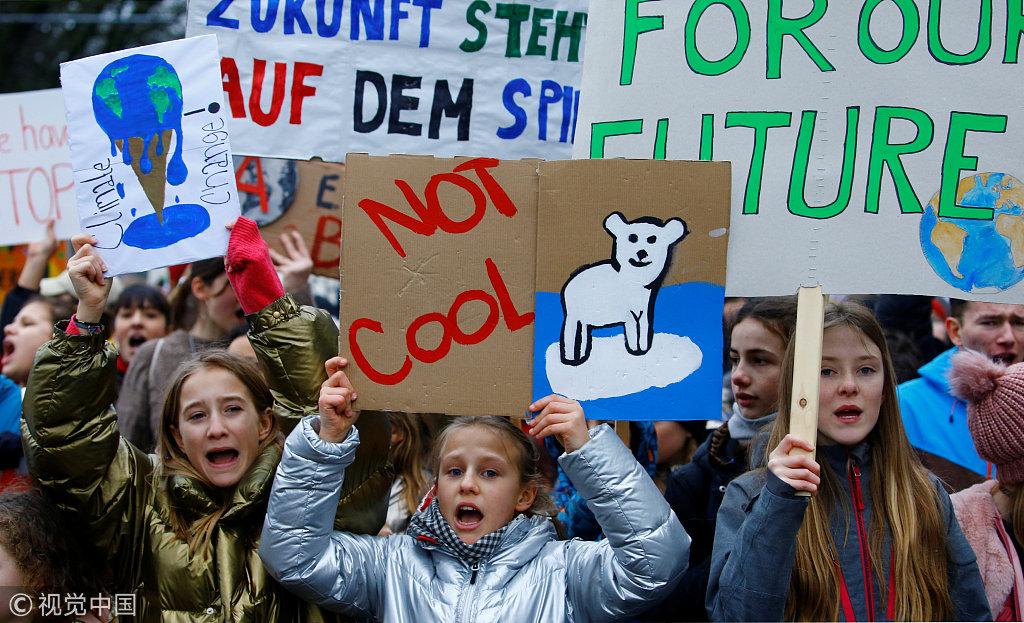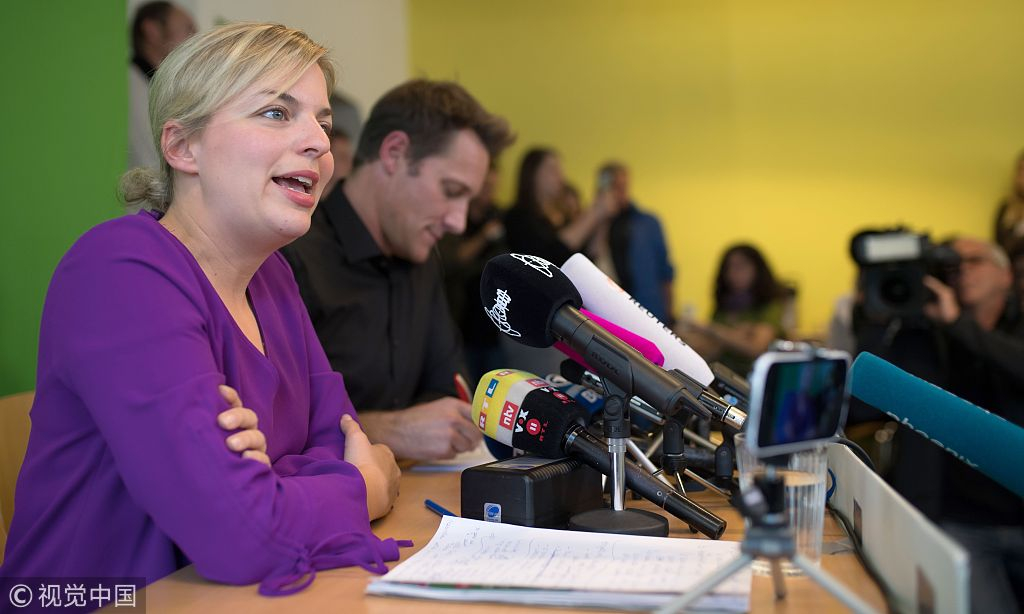For the first time in the country's history, Slovakia's new president will be a woman. Zuzana Caputova's background: An environmental lawyer and activist.
In the Swiss cantonal parliaments of Zurich, Luzern and Baselland, the Green party and the Green Liberals won a massive number of seats at the expense of the conservatives, specifically the right-wing Swiss Peoples Party (SVP).
In the Zurich parliament, the Greens and Green Liberals now occupy nearly a quarter of all seats. Of the latter, nine out of the 10 candidates are women. "They have benefited from the current climate debate," leading Swiss newspaper
NZZ concluded Monday, projecting similar results for the national election in October.
The trend away from male, right-wing, and anti-immigrant candidates to female, left-wing, green politics began earlier. In October last year, the German federal state of Bavaria saw a historic win for the Greens in their state elections, which more than doubled their seats, making them the second strongest power in Bavaria's parliament with 17.5 percent.
The "Friday For Future" pupils' strikes, inspired by Swedish climate activist Greta Thunberg, have reinforced the trend towards green, female leaders.

Swedish youth climate activist Greta Thunberg poses during an interview with during the World Economic Forum (WEF) annual meeting, in Davos, Switzerland January 23, 2019. /VCG Photo
Swedish youth climate activist Greta Thunberg poses during an interview with during the World Economic Forum (WEF) annual meeting, in Davos, Switzerland January 23, 2019. /VCG Photo
Thunberg first began protesting in front of the parliament in Stockholm, to push Sweden to do more to fight climate change. Hundreds of thousands of young people around the world joined her protest every Friday instead of going to school. In Germany, around 155 local groups are part of the movement,
Xinhua reported. Thunberg has since spoken at the UN Climate Change Conference in Poland and the World Economic Forum (WEF).
Dominating the agenda
The climate debate launched by the student protest has dominated the public agenda, especially in European countries. Google Trends show search requests for "Greta Thunberg" spiked in Sweden, Italy, Luxembourg, Germany and Switzerland. The term "Friday For Future" is prominent in Germany and Italy, while "climate strike" was most searched for in New Zealand, Australia, Ireland, Luxembourg and the UK.
As climate change claims more space in the public sphere, it is likely to influence people's voting decisions. Researchers call the mechanism behind this the "agenda-setting effect."
The thesis: Mass media, including social media, may direct the attention of individual voters and the public sphere as a whole on specific issues.
The mechanism was exemplified during the 2017 German elections when the right-wing AfD won while leading all media ratings with its discourse against migrants, Brussels-based political scientist Regula Stämpfli told CGTN Digital in an interview after the recent elections in Europe.
The same might be happening with the environmental issue which has had strong media coverage thanks to the student protests.

Participants display posters during a demonstration against climate change in Zurich, Switzerland February 2, 2019. /VCG Photo
Participants display posters during a demonstration against climate change in Zurich, Switzerland February 2, 2019. /VCG Photo
Its immediate effect on the Zurich cantonal elections was that the media broadly reported on the young, new political forces in favor of the climate movement, explained Stämpfli, who specializes in European political decision-making and women's history.
In addition to the agenda-setting effect, Stämpfli said the "image effect" also played a role in the recent success of green, female candidates. Young people, especially women, provide photo motifs that people like to share on social media. In regards to the recent cantonal elections in Zurich, the effect was amplified by the small electoral area.
"Many of those adolescents have parents who are voting, and who voted for the first time for the Green Liberals or the Greens instead for a conservative middle-class party."
The fact that a 16-year-old girl who decided to protest for climate change in Sweden was able to turn the Zurich parliament upside down did not sit well with established conservative politicians. But in a globalized world, the political direction can change fast and unexpectedly due to factors that are not directly connected to local conditions.

Slovakia's presidential candidate Zuzana Caputova receives flowers after winning the presidential election, at her party's headquarters in Bratislava, Slovakia, March 30, 2019. /VCG Photo
Slovakia's presidential candidate Zuzana Caputova receives flowers after winning the presidential election, at her party's headquarters in Bratislava, Slovakia, March 30, 2019. /VCG Photo
In the case of Slovakia, both national and international themes played a role when Caputova was elected the first female president of the country. President-elect Caputova's anti-corruption campaign when the country was "yearning for a fresh approach," in conjunction with the distrust in the political establishment, as her chief strategist told
Politico, was undoubtedly the leading cause for her victory.
At the same time, the climate strike was also on people's minds in Slovakia. "Friday For Future" strikes were also organized in three cities in Slovakia, including the capital Bratislava, the
Slovak Spectator reported. And Caputova is known for her environmental activism. In 2016, after campaigning to shut down a hazardous garbage dump in her hometown of Pezinok, near Bratislava, Caputova won an
environmental prize.
Impact uncertain
“In Europe, developments in one country influence events in other countries and can have an inspirational effect,” Caputova told Politico a few days ahead of her victory.
But whether the green and female wave will sweep over to the upcoming European Parliament elections on May 23 depends on whether the climate movement can keep its momentum.
If the public agenda is preoccupied with climate change instead of migration or national identity, green movements are going to show success long-term and in all of Europe, Stämpfli said. She points out that national agendas primarily shape the European Election outcomes.

The top candidates of the ecologist Green party in Bavaria Katharina Schulze and Ludwig Hartmann after the Bavaria state election October 15, 2018. The Greens surged to become the second strongest party with 18 percent of the vote. A green, female wave has since swept through parts of Europe, enhanced by the recent climate debate. /VCG Photo
The top candidates of the ecologist Green party in Bavaria Katharina Schulze and Ludwig Hartmann after the Bavaria state election October 15, 2018. The Greens surged to become the second strongest party with 18 percent of the vote. A green, female wave has since swept through parts of Europe, enhanced by the recent climate debate. /VCG Photo
"At present, the European Elections are not yet under the light of fighting against climate change," she said, adding that if the media coverage in the member countries does not see a substantial change, the elections will instead be characterized by right-wing populism, rather than climate change.
However, even if the student climate strike can keep its spot on the media agenda – political change is uncertain.
As long as the climate movement only creates public outrage and does not transform into making and implementing concrete demands, there will be no real impact, Stämpfli said. China, which is more advanced in technological innovation in that regard, has the potential to foster political change regarding environmental protection in Europe massively and rapidly if it manages to implement its technology more sustainably, she said.
"Climate change is not only a technological, but first and foremost, a democratic and political mission."






